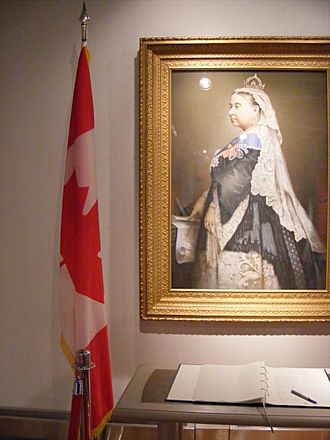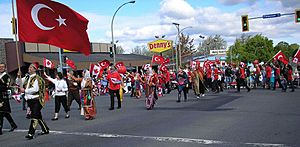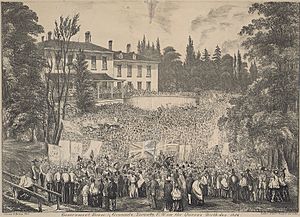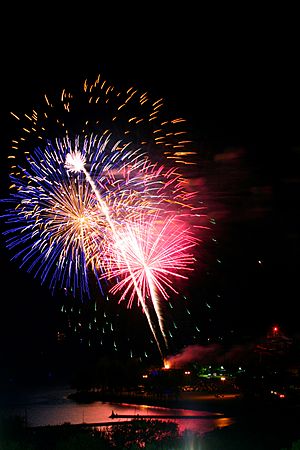Victoria Day facts for kids
Quick facts for kids
|
|
|---|---|

A portrait in Ottawa City Hall of Queen Victoria, first sovereign of a confederated Canada
|
|
| Official name | Victoria Day French: Fête de la Reine |
| Also called | May Long Weekend, May Long, May Two-Four, May Run, Firecracker Day |
| Observed by | Canadians |
| Type | Historical, cultural, nationalist |
| Celebrations | Fireworks, parades |
| Date | Last Monday preceding May 25 |
| 2025 date | May 19, 2025 |
| 2026 date | May 18, 2026 |
| 2027 date | May 24, 2027 |
| 2028 date | May 22, 2028 |
| Frequency | Annual |
| Related to | Queen's Official Birthday |
Victoria Day is a special holiday in Canada. It is also known as French: Fête de la Reine, which means "Celebration of the Queen." This day is a federal public holiday. It happens on the last Monday before May 25 each year.
The holiday first honored Queen Victoria's actual birthday. Now, it also celebrates the official birthday of Canada's current ruler. Many people see Victoria Day as the start of the summer season in Canada.
Canadians have celebrated this holiday since at least 1845. It was first held on Victoria's real birthday, May 24. This holiday is unique to Canada. It is celebrated all across the country. The date always falls on a Monday between May 18 and May 24.
Victoria Day is a federal holiday. It is also a holiday in six of Canada's ten provinces. All three of its territories also celebrate it. In Quebec, before 2003, the Monday before May 25 was unofficially called the French: Fête de Dollard. This day remembered Adam Dollard des Ormeaux. In 2003, Quebec officially changed the holiday to National Patriots' Day.
Contents
History of Victoria Day in Canada
The birthday of Queen Victoria was a day for celebration in Canada. This happened long before Canada became a country. The first law about it was passed in 1845. This law officially recognized May 24 as the Queen's birthday.
In 1854, about 5,000 people in Canada West gathered. They cheered for Queen Victoria on her 35th birthday. They met in front of Government House in Toronto.
A typical celebration in the 1800s happened on May 24, 1866. In Omemee, Ontario, people had a day-long party. It included a gun salute at midnight and early morning music. There were also picnics, sports, and a torch-light parade. By the 1890s, this day was a "patriotic holiday."
Changes to the Holiday Over Time
Queen Victoria died in 1901. After her death, May 24 became a legal holiday called "Victoria Day." It was a day to remember the Queen. She was seen as the "Mother of Confederation." In 1904, the same date became Empire Day across the British Empire.
Over the years, the official date for the reigning ruler's birthday changed. This happened through different royal announcements. In 1952, the system was made simpler. Both Empire Day and Victoria Day were moved to the Monday before May 25. The monarch's official birthday in Canada was then set for this date every year. This link was made permanent in 1957.
In 1958, Empire Day was renamed Commonwealth Day. In 1977, Commonwealth Day moved to the second Monday in March. This left the Monday before May 25 as both Victoria Day and the Queen's Birthday.
Sad Events on Victoria Day
Victoria Day celebrations have had sad events twice. In 1881, a passenger ferry called the Victoria overturned. This happened in the Thames River near London, Ontario. The boat had too many people on board. Many lives were lost in this event. It became known as the "Victoria Day disaster."
Then, in 1896, the Point Ellice Bridge disaster happened. This was in Victoria, British Columbia. A bridge collapsed under the weight of a streetcar. The streetcar was full of people going to Victoria Day celebrations.
In 2013, some famous Canadians asked for a change. They wanted the holiday to be called "Victoria and First Peoples Day."
How Provinces and Territories Celebrate Victoria Day
Most workplaces in Canada follow rules set by their province or territory. So, even though Victoria Day is a federal holiday, whether you get a paid day off depends on where you live. This is true unless you work for a federally regulated business like a bank.
Victoria Day Status Across Canada
- Alberta, Manitoba, the Northwest Territories, and Yukon: It is a general holiday.
- British Columbia, Ontario, and Saskatchewan: It is a statutory holiday.
- Newfoundland and Labrador: It is a government holiday, but not a paid public holiday for everyone.
- Nova Scotia: It is a "non-statutory holiday." Stores do not have to close.
- Prince Edward Island: It is included in the definition of "holiday," but not a paid public holiday for everyone.
- Nunavut and New Brunswick: It is a general holiday. In New Brunswick, stores must be closed. This day marks the official birthday of the reigning ruler.
- Quebec: The day was called the French: Fête de Dollard. In 2003, it was renamed National Patriots' Day. This day remembers the patriotes from the Lower Canada Rebellion of 1837.
| Jurisdiction | Paid holiday (for provincially regulated employees) |
|---|---|
| Alberta | Yes |
| British Columbia | Yes |
| Manitoba | Yes |
| Newfoundland and Labrador | No (government employees only) |
| New Brunswick | No (but retail businesses must be closed) |
| Nova Scotia | No |
| Ontario | Yes (except for employees of the Crown and certain public bodies) |
| Prince Edward Island | No |
| Quebec | Yes (equivalent holiday) |
| Saskatchewan | Yes |
| Northwest Territories | Yes |
| Nunavut | Yes |
| Yukon | Yes |
How Canadians Celebrate Victoria Day
Canada is the only country that has an official holiday for Queen Victoria. On Victoria Day, the Royal Union Flag is flown. It flies from sunrise to sunset at all federal government buildings. This happens where there are two flagpoles. The Canadian national flag always flies on the main pole.
Parades and Fireworks
Many cities have a parade on this holiday. The biggest parade has been in Victoria, British Columbia since 1898. In nearby New Westminster, there is a special tradition. It is called the Hyack Anvil Battery Salute. Gunpowder is placed between two anvils. When it ignites, the top anvil flies into the air. This is like a 21-gun salute.
Other celebrations include evening fireworks shows. You can see these at Ashbridge's Bay Beach in Toronto. Another show is at Ontario Place in the same city.
In Ottawa, a ceremony called the Trooping of the Queen's Colour takes place. It happens on Parliament Hill or at Rideau Hall. The Queen is the main person at this ceremony. If she is not there, other important people take her place. These include members of the Royal Family or the Governor General.
Beginning of Summer Fun
Across Canada, Victoria Day marks the end of winter. It is the unofficial start of the summer season. For example, Banff, Alberta's Sunshine Village ski resort closes on Victoria Day. Many summer businesses also open during this long weekend. These include parks, outdoor restaurants, and bike rentals.
Victoria Day also marks the start of "cottage season." Many people open their summer homes. Gardeners in Canada also see Victoria Day as the start of spring. It is usually safe to plant flowers and vegetables then. There is also a tradition for clothes. Lighter summer clothing was worn from Victoria Day until Labour Day.

Nicknames and Songs
The holiday is often called "May Two-Four" in some parts of Canada. This name has two meanings. It refers to May 24, the date around which the holiday falls. It also refers to a "two-four," which is Canadian slang for a case of twenty-four beers. This drink is popular during the long weekend.
The holiday weekend is also known as "May long weekend" or "May Long." Sometimes it is called "May Run." In Ontario, it was once called "Firecracker Day."
There is a short, traditional song about Victoria Day: "The twenty-fourth of May / Is the Queen's birthday; / If they don't give us a holiday / We'll all run away!" The Canadian rock band Rush mentions the holiday in their song "Lakeside Park." The song says, "everyone would gather on the 24th of May, sitting in the sand to watch the fireworks display."
See also
 In Spanish: Día de Victoria para niños
In Spanish: Día de Victoria para niños
- Monarchism in Canada
- Bermuda Day, a holiday in Bermuda. It was once called Victoria Day. It is celebrated on the Friday closest to May 24. It also marks the unofficial start of summer.
- Memorial Day, a U.S. holiday. It falls on the last Monday of May. It is also seen as the beginning of summer.
 | Sharif Bey |
 | Hale Woodruff |
 | Richmond Barthé |
 | Purvis Young |



